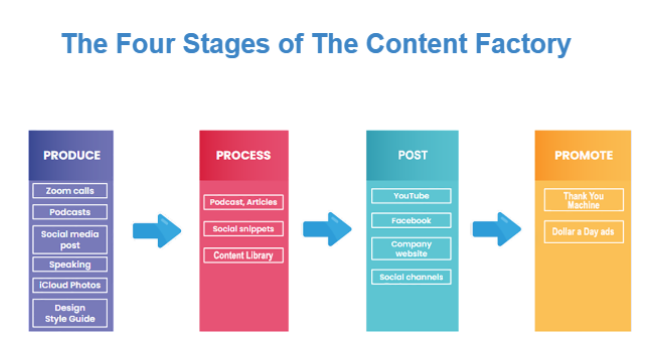We just got the green light from Joshua Crouch of Relentless Digital to publish the audit of the $25,000 he took from Travis and Sons, a plumbing company.
The client is filing a chargeback, which is hopefully within the timeframe allowed.
Note that scammers usually threaten legal action, like Joshua Crouch did here, or in some cases, they attempt to take control of everything, as Tristan Parmley did.
But this only backfires, since this only brings them more attention. And they can’t argue the facts of a digital audit.
Other agency owners have said this guy is “arrogant AF”.
Are you ready to see another proud scammer get taken down?
NOTE: if he simply would have done the work promised (to rank on plumbing terms in Gilbert or Fountain Valley) or refunded the money, everything would be alright.
But instead, he decided to send me this, which was authored by Katya Lancero, who appears to be an Indian and tribal relations lawyer…?
Anyways:
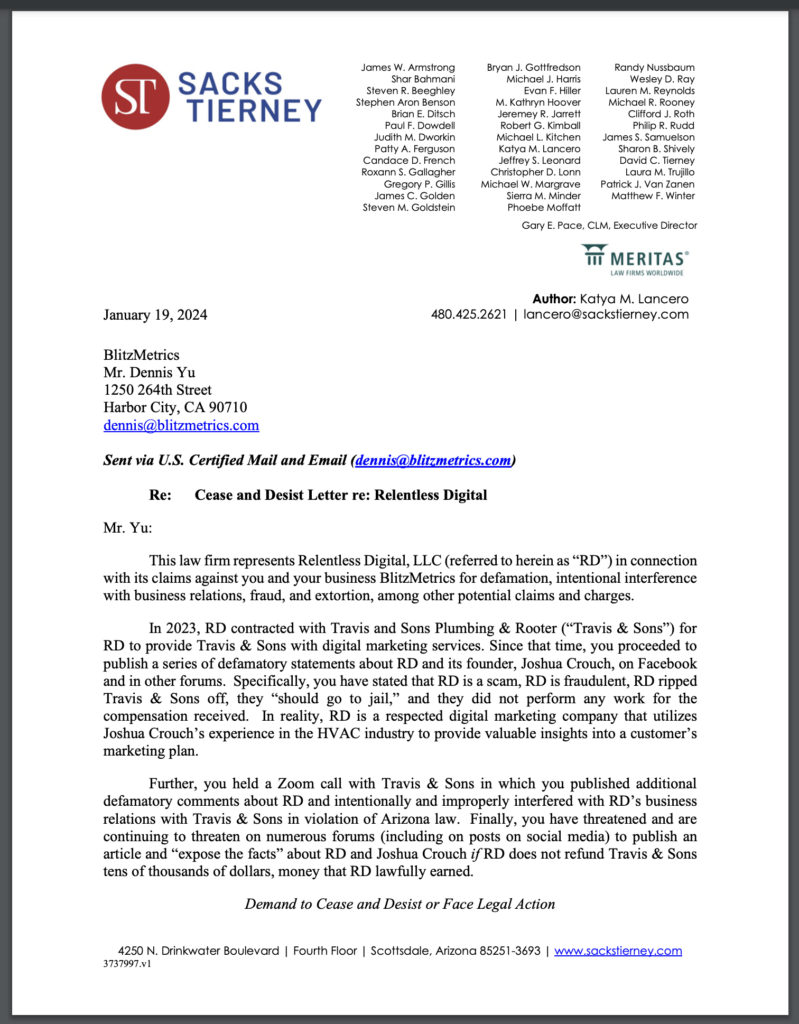
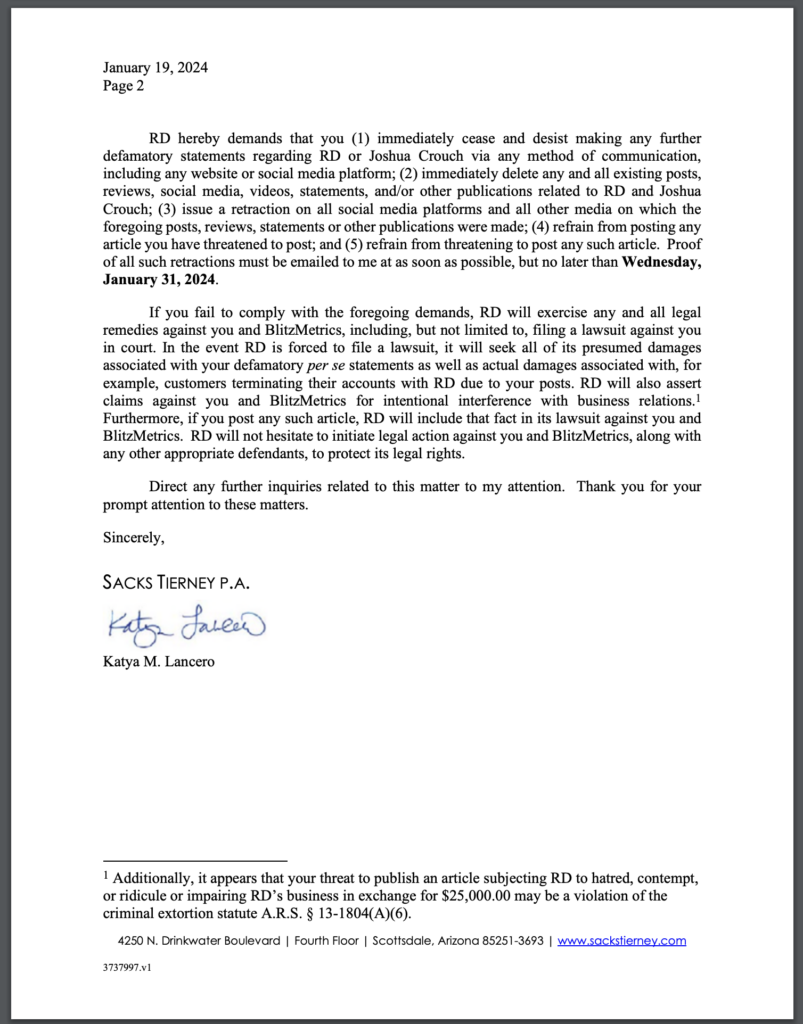
Travis and Sons Website Audit
During a website audit, the first thing we check is the homepage’s overall strength and the weight a particular page carries. Now, this website’s DR is only 11, which means there aren’t many relevant websites linking to it. Zero traffic and barely any keywords ranking – in other words, no SEO work has been done on the website.
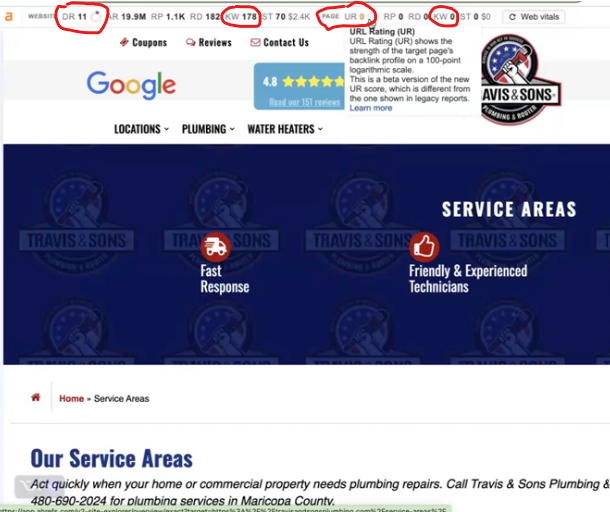
This is the most powerful page on their website.
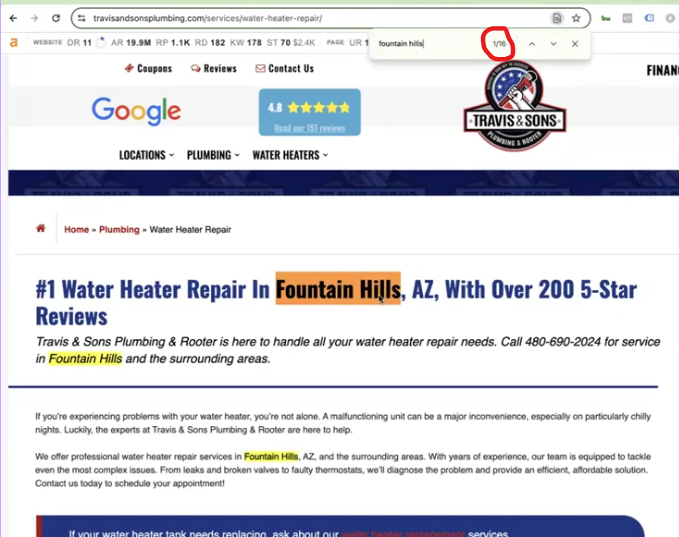
But there’s a red flag here. The term ‘Fountain Hills’ is repeated 16 times throughout the article. Imagine somebody talking to you and they keep saying ‘Fountain Hills’ over and over again. It would sound too robotic and you wouldn’t talk like that in real life, would you? Exactly.
This strategy might’ve worked back in the day, but search engines are smarter now and Google will consider this spam.
Buying backlinks is a big no-no. It’s not just ineffective, it’s downright shady, and Google sees right through it. Look, the top link is ‘Chicken Rate in Hyderabad,’ linked from the anchor text ‘plumber in mesa’ on their website. Pretend you’re Google. Does that look legit? Nope. It screams ‘spam’ because it’s totally irrelevant. So, bottom line: Google won’t be fooled by this kind of stuff, it’s all about relevance, and this ain’t cutting it.
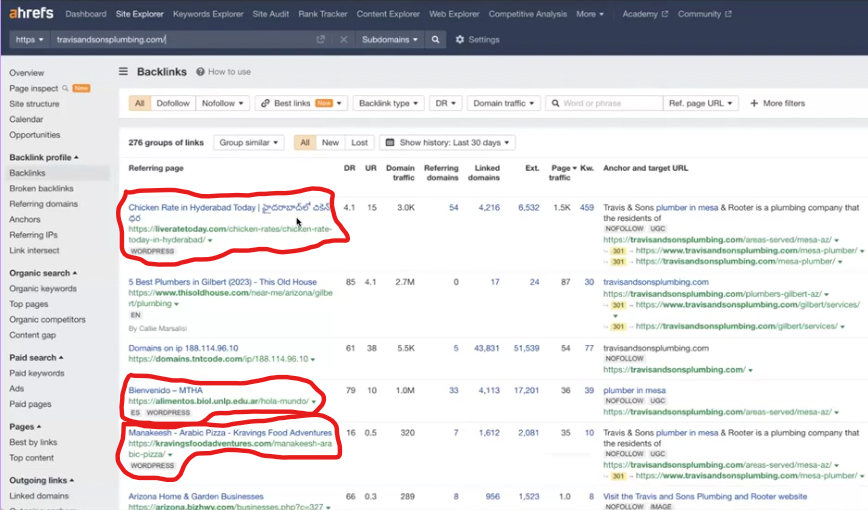
If we ask Josh Crouch, he’d deny any up and down that anyone’s buying links. He’ll deny that he outsources all these guys and still deny it.
Someone’s been acquiring garbage links, and because of the nature of these links, particularly with the anchor text like “plumber and Mesa,” it’s evident that someone is attempting to purchase links on your behalf.
To Josh Crouch’s credit, this strategy did yield results for many years until Google intervened, advising against such practices.
Some of these links appear to be directory listings, where you pay around 10 bucks a month or shell out a couple of hundred dollars to be listed in a local roofing network or similar.
However, these listings don’t hold much weight as you can see
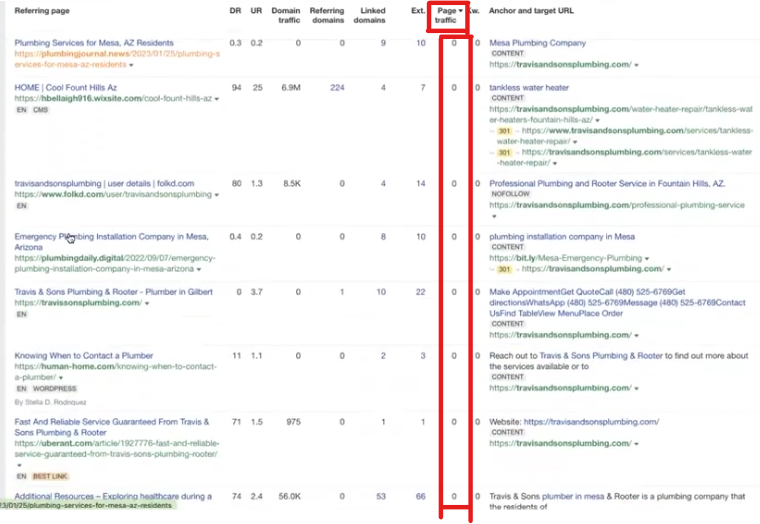
Keep in mind, Google prioritizes relevancy. It’s crucial that your presence aligns with your actual services, like being a plumber in Gilbert or Fountain Hills. You should be associated with other businesses or residents of Fountain Hills.
The issue here is the lack of relevance in these links and listings. They’re all just attempting to spam you into these listings. Now, I wouldn’t even recommend doing this because it’s low-quality, but if you were to do it, you could find services on Fiverr or other platforms for less than a hundred dollars to do it correctly.
And well, Josh subbed it out to one of these people, you know, paid him a hundred dollars. Meanwhile, he’s collecting 3000 a month. So it’s super profitable for him.
They listed you for this fine catering thing. So they created a fake listing here.
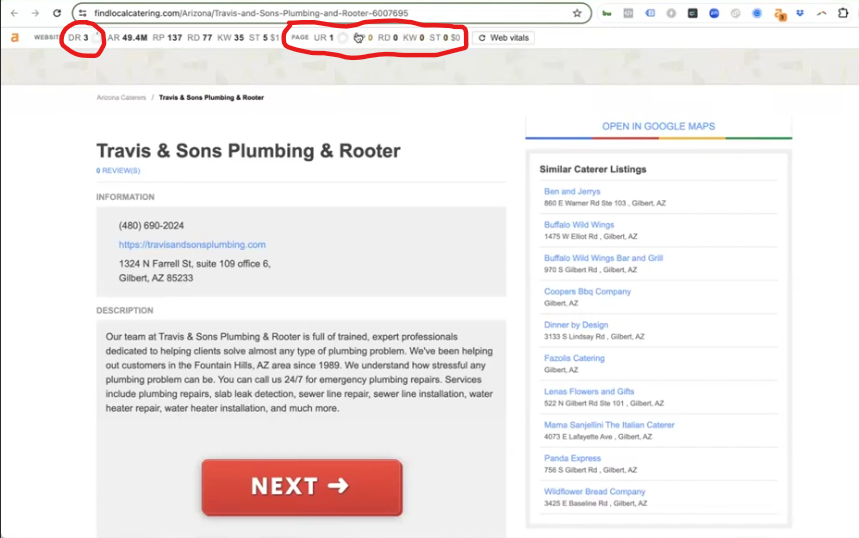
Buffalo Wild Wings, Ben Jerry’s, Cooper’s BBQ. This listing on ‘Find Local Catering’ isn’t showing up in searches, and the site itself has a low Domain Rating (DR3).
It seems someone, maybe from some random country or elsewhere, was paid to get backlinks for the business.
However, Google easily identifies these links as low-quality, and as a result, they don’t actually contribute positively to improving the website’s visibility in search results. It’s not doing anything good for the overall online performance. And therefore it doesn’t show up. And that’s why the phone is not ringing.
And people like Josh Crouch, he’s not trying to do evil. He’s trying to make money. Just like Roger said, bad plumbers became bad plumbers because they were taught by bad plumbers, so they don’t know any better.
Josh Crouch may suspect, there’s this one Client, Matt, who’s unhappy. But there’s all the, I was taught by so and so how to make money using the internet, so he doesn’t feel like he’s a scammer.
Imagine you have a heart condition, and someone comes to you claiming they attended a weekend training on heart surgery. However, their attempts consistently result in deaths. That’s what happened here.
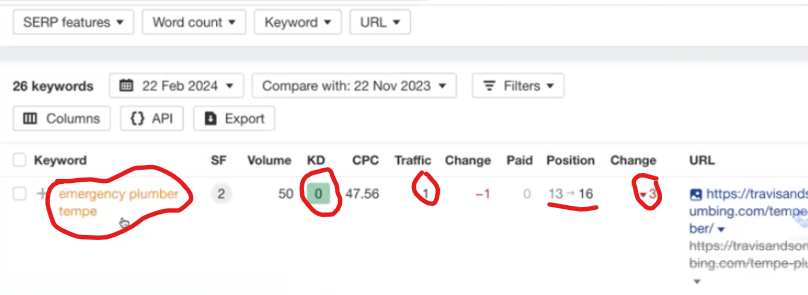
See here, zero keyword difficulty, and the traffic is pretty low. The traffic is nearly zero, and this page’s position has dropped from 13–16. We are not showing high enough to get any traffic and the reason why – look at this page Tempe plumber.
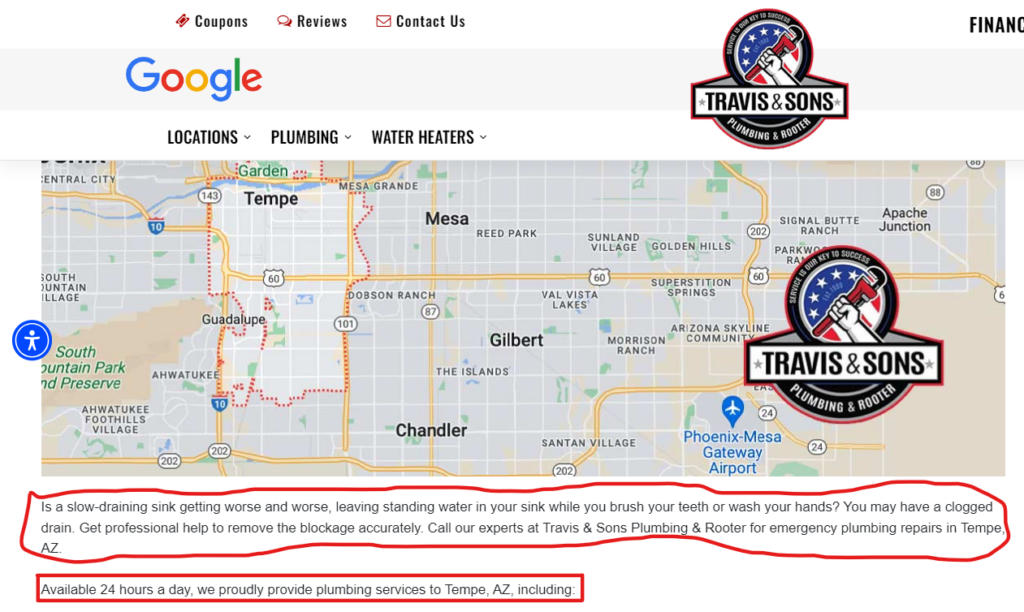
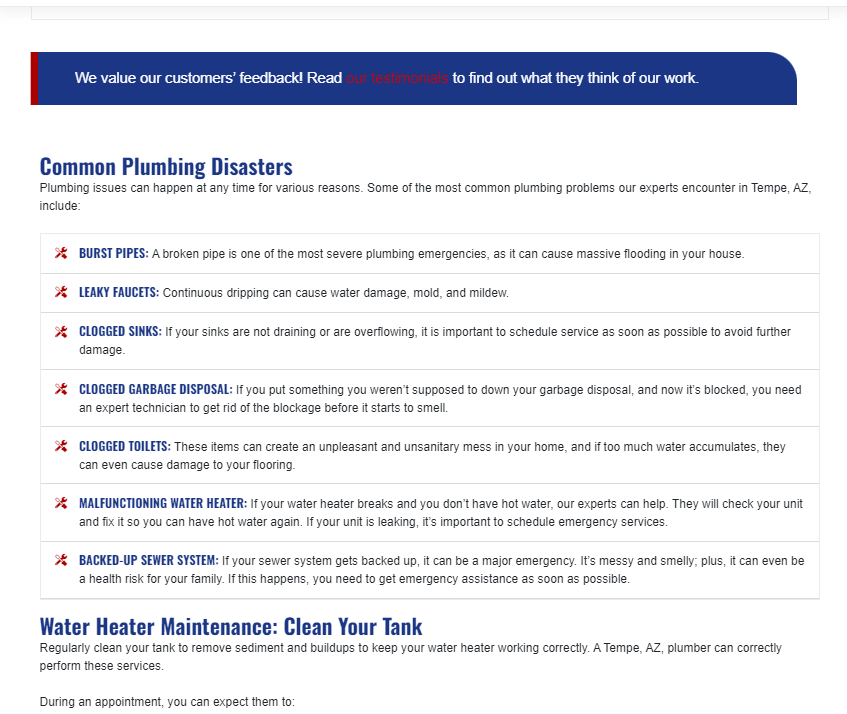
But let’s look at it from a very simple standpoint. If you are Google and you’re looking at this location page for Tempe, how much proof can you see if there is a real plumber in Tempe and who’s actually doing work there, versus something that anybody could just auto-generate?
Is there anything here that shows you that this page abides by Google’s standards of E-E-A-T, of showing real experience in Tempe, other than unclogging drains and fixing broken toilets?
Now I will ask ChatGPT to analyze this page by copy-pasting everything from the page
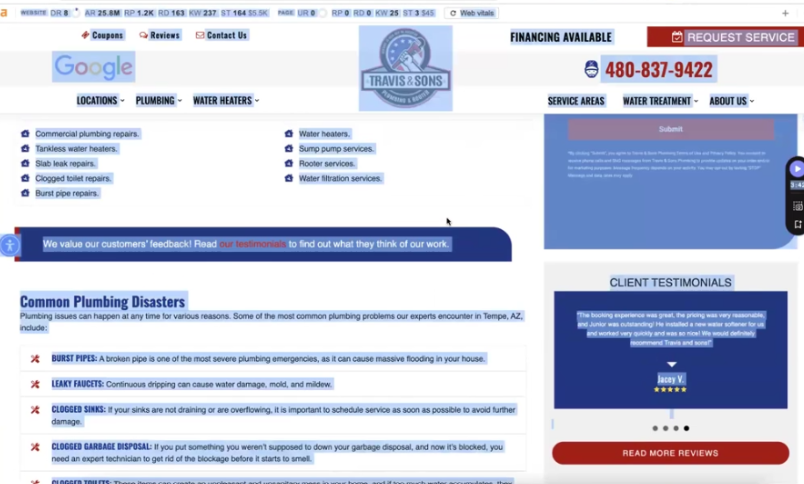
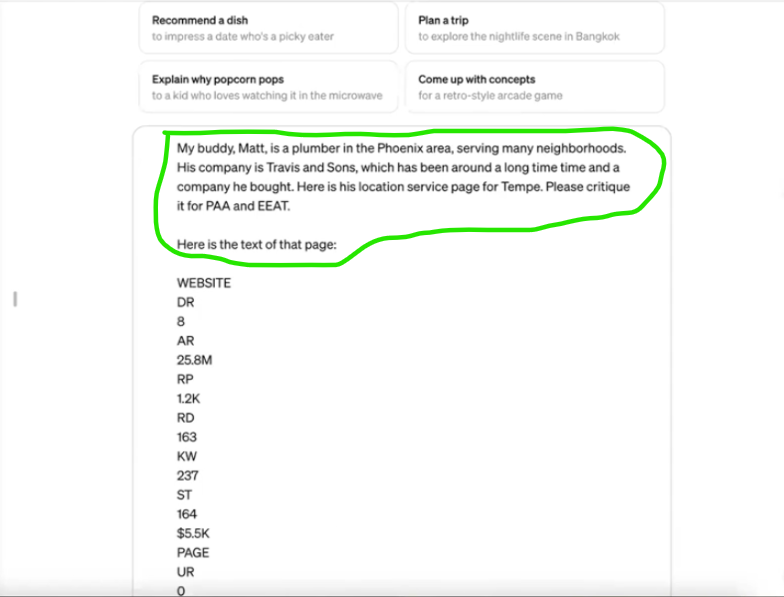
“My buddy, Matt, is a plumber in the Phoenix area, serving many neighborhoods. His company is Travis and Sons, which has been around a long time and a company he bought. Here is his location service page for Tempe. Please critique it for PAA and EEAT.”
Now by giving ChatGPT context, it can easily analyze what’s wrong with this page.
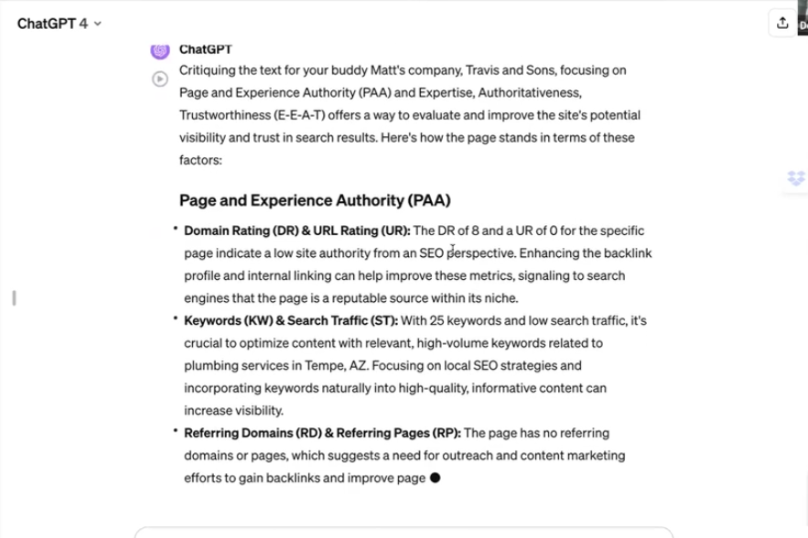
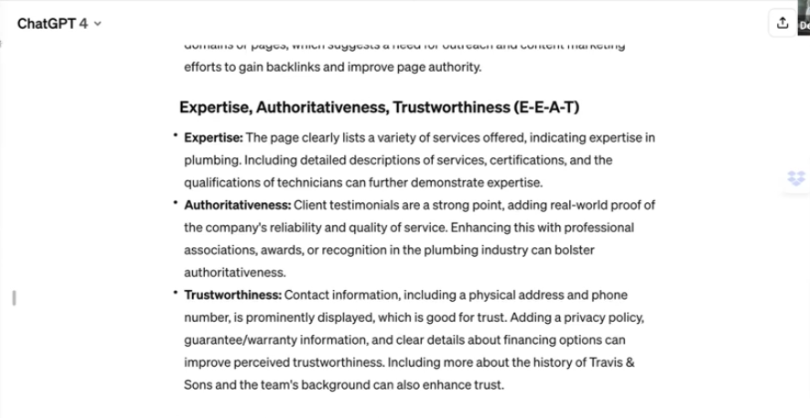
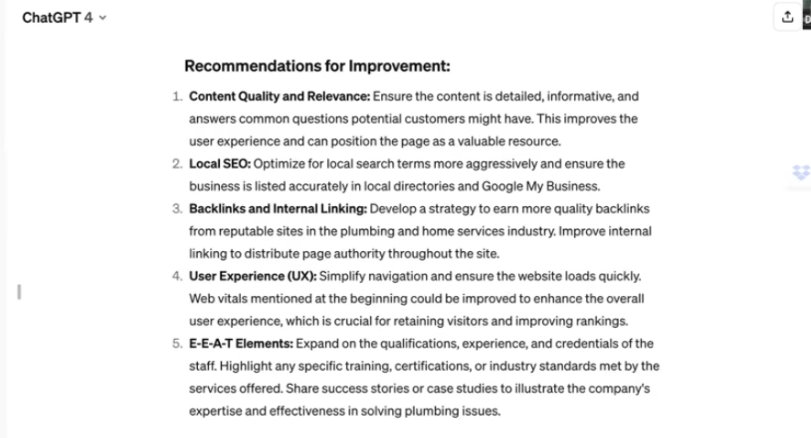
ChatGPT will examine the page to pinpoint any necessary fixes or improvements.
The solution to this problem is quite simple. Compile a folder showcasing your plumbing services in Fountain Hills, including videos of you visiting local landmarks such as McDonald’s and other favorite spots in the area.
This content will emphasize your affiliation with Fountain Hills, which in turn builds trust. After gathering these videos, proceed to step 2 of the content factory process, which involves transforming them into articles, blog posts, and videos. Finally, distribute this content across your social media channels and website.
But some people like Grant Lira offer PR that’s questionable, claiming to be experts without genuine experience or expertise, which leads to what we call ‘Fake PR’ because it takes real experience to build authentic PR.
